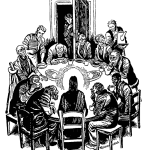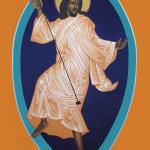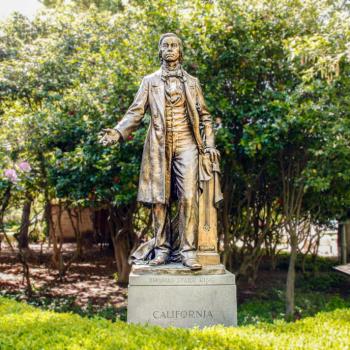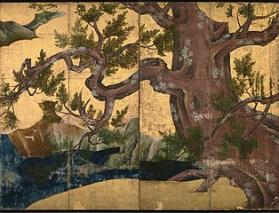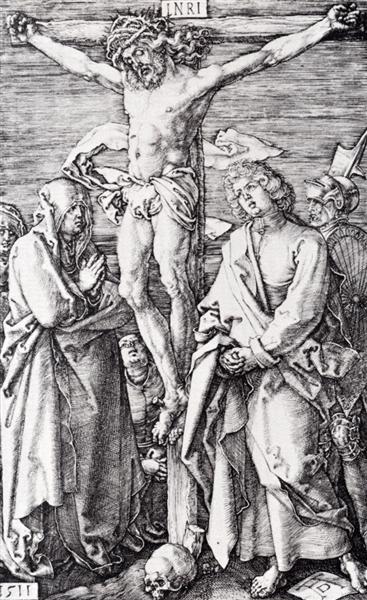
Albrecht Durer (1511)
Every Day is the Good Day:
A Zen Meditation on Good Friday
Yunmen, asked, “I do not ask you about the fifteenth of month. Come. Tell me about after the fifteenth. He then gave his own response, “Every day is a good day.”
Blue Cliff Record, Case 6
Today is Good Friday. And I find it a perfect day to consider a koan.
Koans are not puzzles, although they look like them. Rather they’re invitations. They point, they invite.
As, I believe, Good Friday can be. A strange turning moment in the Christian tradition. Historically considered a confusion, the prophet, the messiah, is unexpectedly arrested, tortured, and today, put to death in a terrible manner.
The whole of Holy Week is filled with conundrums, reversals, and even stranger turnings. Today, Good Friday is the linchpin.
As a text for today, I turn to Yunmen Wenyan. Who flourished on the cusp between the ninth and tenth centuries, dying in 949 of our common era. When I come to Good Friday I often think of this koan. And on occasion I’ve share my thoughts. Today I return to the story of Good Friday and that koan.
For those unfamiliar with the metaphor of the fifteenth of the month, in East Asian Buddhism, the fifteenth is the full moon. And it often stands as the image of awakening. Enlightenment. (So does the empty moon, but that would be another conversation.) So, the set-up is not a question about approaching awakening, our liberation, our saving.
The shared project of religion, as I see it. Meeting the world, and our brokenness, the anxiety that wracks most lives one way or another, and points to something. In Jesus’ telling, it points to the Kingdom of God. In his collected sayings we find that kingdom, whatever it is in its fullness, also exists partially in the future, and partially in the this moment.
The koan is an invitation into the awakened heart. And. Good Friday is an invitation into the kingdom.
One can, and people do argue over whether in some final sense these destinations are the same or different. For me the answer, and I mean it without trying to be glib, is yes and no. But as far as the no goes, I think we can find valuable hints in looking at the yes part. And this koan offers something of that yes.
This story was told in the midst of very, very hard times. In times of war and rumors of war. Marked by hunger and danger in every corner. No one on the Zen way takes that “every day is a good day” as a nostrum. This is not calling for some feel good response. Although feeling good is not not part of it. But here we’re being invited into something rather larger.
The Zen teacher Susan Murphy, in her wonderful book Upside Down Zen writes of a friend who was dying of AIDS. He offered his comment on the koan, “’Every day is Good Friday.’”
From a dying man’s mouth. Every day is Good Friday. A pointer.
Roshi Murphy tells us how “This is a powerful and illuminating turning phrase. The mystery and the passion of Good Friday – and the astonishing fact that such a day is called ‘Good’ – is enacted every day in every life upon the Earth, in some measure. This is where we live.”
She reminds us, “Yunmen was offering no blandishments at all, but the hardest of all possible challenges.” Slyly she adds, “We notice, with gratitude, that he didn’t say ‘Every day is a nice day.’”
Every day is a nice day is a lie. Or, rather, it is so far short of the reality that it is not helpful. Every day is a good day is the truth. As is every day is Good Friday. They are not two things. Here that yes and no of whether all religions point to the same thing, well, those words burn away.
Jesus’s last words as he hung dying on that cross, as captured by the gospel writers are each a bit different. Luke says he said “Father, forgive them, for they know not what they do,” then “Truly, I say to you, today you will be with me in paradise” said to a thief, and for which there’s a lovely midrash where a Japanese Zen priest was told by an Orthodox Christian priest that this line should read “Today you are with me in paradise.” The Zen teacher wasn’t particularly impressed with “will be in paradise.” But he felt “are with me in paradise” a direct pointing.
Here. Now. Yes and no collapse in the hurt of a man hanging on a cross, in the simple words of an old monk speaking to his suffering companions.
There are other words tumbled up in the accounts of the event. John, whose composition is at least three generations after the events and so the farthest out of any of the canonical gospels has Jesus say “Woman, behold your son. Son, behold your mother,” then “I thirst,” and finally “It is finished.”
The words I find most compelling, haunting, of them all is reported by both Matthew and Mark, generally believed to be the closest texts to the actual event, where Jesus says “My God, my God. Why have you forsaken me?”
The sermon-like last words, I take with a grain. Despair last words, those I get. When the great Zen master Yantou was old, his monastery was sacked by bandits. One of the bandits stabbed him. It is said his dying scream could be heard ten miles away.
That this renowned master could scream at his death so haunted a later young monk, Hakuin, that he would despair of even finding awakening, doubting that it could even be true. Hakuin would eventually see through to the heart of the matter. And it could be found in that scream. And, our own saving can be found in those last words, My God, my God. Why have you forsaken me?”
Now Christian thinkers have had a terrible time trying to put this story, all of it from the entry into Jerusalem to this horrific death, and then to a story of resurrection, into some clear explanation. In fact, there are to this day contending explanations, what they call “doctrines of atonement.” Few of them square.
Reason and putting the things of our lives all together, sorting and sifting, is powerful and important. I so love Occam and his terrible razor to this day. But. And. When we come to this story and that koan, we are fully into the dream world of our human heart’s longing. And the heart’s reasons are of a completely different physics.
Here we find the razor cutting the divided world into one. Here we are invited into the Mandala of Holy Week, where the human journey is revealed.
And here’s where it points and the koan revealed.
In the midst of our suffering we are liberated. All the parts of our lives are it. There is no moment to be despised.
In the story recalled last Sunday, the entry into Jerusalem and those palm fronds. They are it. Turning over the tables of the money changers. That’s it. Sitting together at a meal with his friends. That’s it. He particularly points to that “it” of it, when he calls their attention to what the bread and the wine really are. Just bread. Just wine. And, him. Both. And.
Later, the empty tomb. That’s it. And, later the dream conversations. They are it, each of them. And they are not separate. Not one exactly, but not two, either.
And we can enter from any point of our lives. Although these hardest times, if we meet them full on, with all our heart and being, well, they may offer the clearest opening into the mystery.
So. Right here, today, as the day turns to night, and thirst and blood and pain, and dying are the matter at hand. That’s it. Every day is Good Friday. The meeting of earth and heaven.
For those have ears to hear, this is good news.
Every day is the good day.


